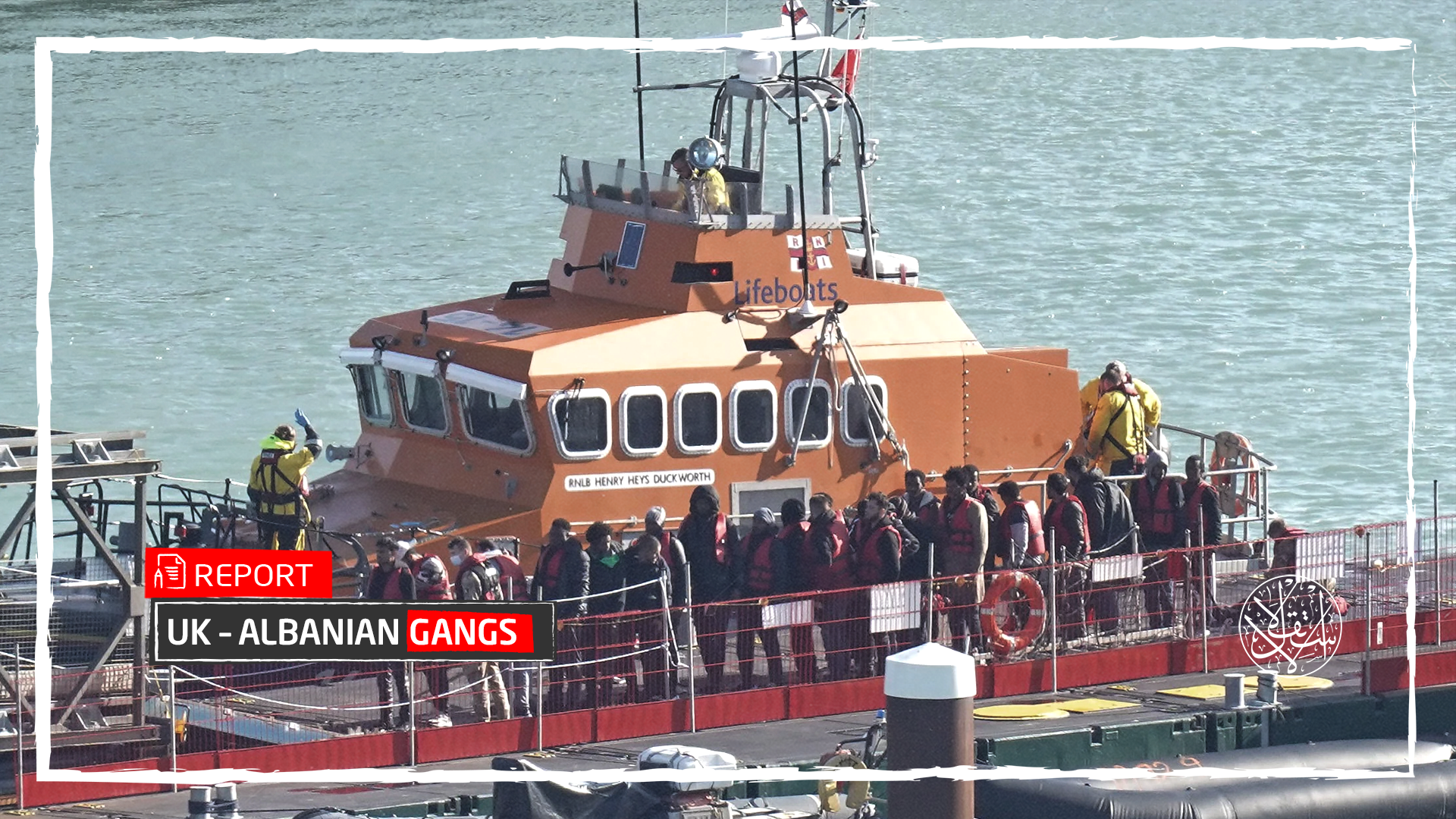This Is How Arabs in Britain Are Victims of Albanian Gangs’ Manipulation

Syrians, Iraqis, and Afghans have often been considered the “fountainhead” of the refugee crisis in the UK. However, British security sources revealed another truth. A third of the people who arrived on boats in 2022 were Albanians, knowing that their country has no armed conflicts and is not classified as a dangerous area.
Many facts started to bubble on the surface about the refugees’ issue, which was often dealt with as being specific to refugees arriving from Muslim countries, especially Afghanistan, Syria, Iraq, and Iran.
In fact, those people paid the price by being subject to harassment and attack before British Home Secretary Suella Braverman revealed that most of those who entered the British territory on boats seeking asylum were Albanian citizens.
According to British Immigration Minister Robert Jenrick, some of the boats have up to 80% of Albanian citizens.
The Minister’s statement seems to hide Albanian drug-trafficking networks that take advantage of the tragic situation of refugees in order to smuggle thousands of people to Britain.

The Surprising Truth
The number of people who arrived from Albania to Britain through different ways rocketed to the top to reach 12,000 people during the first half of 2022, while their number did not exceed 50 people two years ago, before jumping to 800 Albanians in 2021.
Weirdly, 10,000 out of 12,000 Albanians who entered Britain are single men with no children or women; this raises many questions about the reasons behind their arrival without their families.
More than 7,200 asylum requests from Albanian citizens were received during the first half of 2022, and about 50% of these requests were accepted, mostly for women and children, and 14% of requests were accepted for men.
During the same period, Albanians were at the top of the list of refugees who arrived in Britain on small boats.
According to the British Interior data, they represented around 2165, and in second place came the Afghans with more than 2000 people; the Iranians were about 1,723 people, 1,573 Iraqis, and 1041 Syrians.
These figures show that focusing on Arab refugees, especially Iraqis and Syrians, and considering them as the only reason behind the high number of refugees entering Britain is nothing but “defamation.”
However, Arabs from Muslim countries, especially Iraqis and Syrians, were the first to pay the price and the first to be chosen by the British Home Office to be deported to Rwanda.

Reasons Behind Albanians’ Immigration
Three decades after the collapse of Enver Halil Hoxha’s dictatorship and the opening of Albania’s borders, about 60 percent of the country’s adult population expressed a desire to leave, according to a Gallup poll published in December 2018.
Those surveyed said many reasons pushed them to emigrate, like corruption, low salaries, poor working conditions.
The average annual net income for a household in Albania was just €1997 (£1,720) in 2018, according to the latest figures from Eurostat, while in Britain it was €21,464. The unemployment rate for Albanian youth (people between the ages of 15 and 29) reached 20 percent.
Albania applied for EU membership and opened negotiations in July 2022, and now its citizens can currently enter EU countries without a visa and stay for up to 90 days as tourists, but they do not have the right to work, study, or live there.

The Clandestine Channel Threat Commander, Dan O’Mahoney, told the UK Parliament’s home affairs committee last week that there are undoubtedly people who need the British government’s help, but there are also a large number of people “who are deliberately gaming the system.”
“The increase has been exponential, and we believe this is mainly due to the fact that Albanian criminal gangs have gained a foothold in northern France.”
He went on to highlight the role of Albanian criminal gangs in Britain, too. A report by Britain’s National Crime Agency (NCA) published earlier this year said these gangs were responsible for the import of cannabis for large-scale cultivation in Britain.
The NCA says Albanian gangs play a major role in Britain’s £5 billion cocaine market. In 2017, an Albanian was jailed after managing a cocaine smuggling operation valued at nearly £60m.
Albanian Anger
A Balkan Insight report released last August said there was an increase in anonymous TikTok accounts announcing transfers of people from Albania to Britain.
The ads offered to take people from France to Britain on boats for £2,000 or from Belgium to Britain in trucks for up to £5,000.
The British Home Office last year adjusted a preventative program to protect Albanian teenagers at risk of joining gangs smuggling people and cocaine into Britain. Albanians make up one of the largest foreign groups in prisons across England and Wales.
However, British officials’ condemnation of Albanian gangs for exploiting refugees angered Albanian Prime Minister Edi Rama. The latter accused them of discriminating against his citizens.
Rama tweeted on his official account that Albanians in particular are targeted and accused of being the cause behind crimes in Britain and on borders, and the United Kingdom should fight crime gangs of all nationalities.
He added that Albanian citizens work hard and pay taxes, and the British government must stop discriminating and stop justifying their failure at the expense of his citizens.












